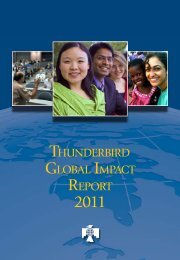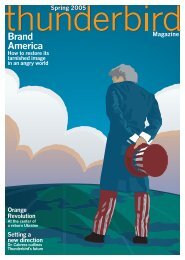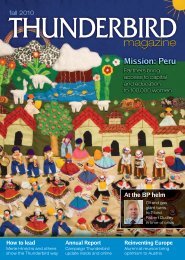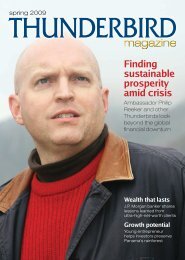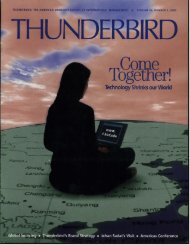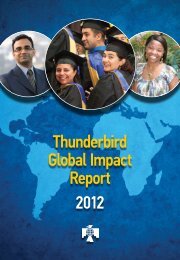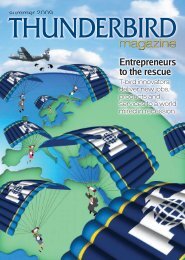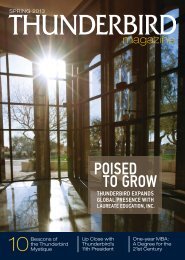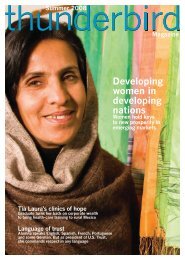Spring 11 MASTER.indd - Thunderbird Magazine
Spring 11 MASTER.indd - Thunderbird Magazine
Spring 11 MASTER.indd - Thunderbird Magazine
Create successful ePaper yourself
Turn your PDF publications into a flip-book with our unique Google optimized e-Paper software.
from the president<br />
Halls of innovation<br />
Time to embrace technology in higher education<br />
Higher education<br />
has not changed<br />
much in the<br />
past thousand<br />
years. Professors gather with<br />
small groups of students<br />
and dispense knowledge in<br />
classrooms built around old<br />
technology such as whiteboards<br />
and textbooks.<br />
The model works well in<br />
many ways but has limits<br />
that keep many prospective<br />
students on the outside looking<br />
in. Ugly incentives built<br />
into the system discourage<br />
inclusion and innovation.<br />
University rankings, for example,<br />
favor institutions that<br />
turn away as many willing<br />
customers as possible. The<br />
more applicants rejected, the<br />
better. The system also favors<br />
inefficient use of resources.<br />
The more money and energy<br />
required to educate one individual,<br />
the better. Prestige<br />
comes with big endowments<br />
and high tuition, not the<br />
reverse.<br />
The limitations of the traditional<br />
classroom model are<br />
most apparent in developing<br />
countries, where huge numbers<br />
of young workers lack<br />
access to higher education.<br />
The world population sits<br />
today at around 7 billion<br />
people. The United Nations<br />
estimates we will add 2.2 billion<br />
people in the next four<br />
decades, which amounts<br />
to about 56 million more<br />
people every year.<br />
The vast majority of this<br />
growth will happen in the<br />
developing world. Yet, as<br />
overwhelming as these numbers<br />
are, the education challenge<br />
we face is not just one<br />
of volume, but one of quality.<br />
Competitiveness is no<br />
longer defined by the availability<br />
of cheap, low-skilled<br />
labor, but by the availability<br />
of well-educated human capital.<br />
Global companies need<br />
talented managers, engineers<br />
and researchers prepared for<br />
knowledge-based jobs.<br />
They need scalable education<br />
solutions that deliver<br />
knowledge in more places<br />
with more flexibility —<br />
without sacrificing quality.<br />
This will not happen merely<br />
by replicating the traditional<br />
classroom model.<br />
<strong>Thunderbird</strong> already has<br />
found success with innovative<br />
business models<br />
and technology-assisted<br />
programs serving highly<br />
qualified learners all over the<br />
world.<br />
Thousands of Russian<br />
managers have earned<br />
<strong>Thunderbird</strong> certificates at<br />
the Center for Business Skills<br />
Development, a for-profit<br />
<strong>Thunderbird</strong> entity with<br />
more than 12 years of success<br />
in Moscow.<br />
<strong>Thunderbird</strong> soon will<br />
replicate this model in more<br />
developing economies<br />
through an initiative called<br />
<strong>Thunderbird</strong> Worldwide.<br />
<strong>Thunderbird</strong>’s Global MBA<br />
for Latin American managers<br />
offers another innovative<br />
option, with live satellite<br />
feeds to remote classrooms<br />
in Mexico and seven other<br />
countries.<br />
<strong>Thunderbird</strong> and its partners<br />
also have reached more<br />
than 18,000 women entrepreneurs<br />
in Afghanistan,<br />
Peru and Jordan through<br />
pioneering nondegree programs.<br />
Drawing on <strong>Thunderbird</strong>’s<br />
innate entrepreneurialism,<br />
we must expand<br />
these efforts and capitalize<br />
on dramatic improvements<br />
in technology reshaping the<br />
business school market.<br />
<strong>Thunderbird</strong>’s Vision 2020<br />
recognizes the urgency to innovate<br />
for scale and impact.<br />
Working together, we must<br />
turn the halls of learning<br />
into the halls of innovation.<br />
Ángel Cabrera, Ph.D.<br />
President<br />
<strong>Thunderbird</strong> School of<br />
Global Management<br />
More online<br />
Visit <strong>Thunderbird</strong> President<br />
Ángel Cabrera’s blog at<br />
knowledgenetwork<br />
.thunderbird.edu/cabrera<br />
TIM CLARKE<br />
thunderbird magazine 3



